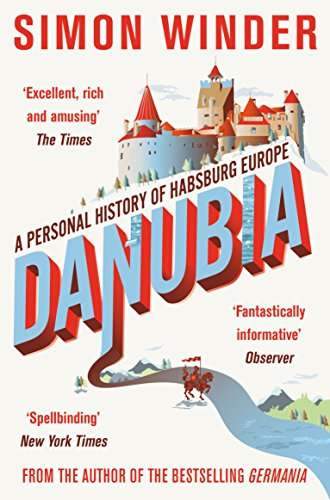Picador, 2013, softcover, 548 pages, condition: as new.
For centuries, much of Europe was in the hands of the peculiar Habsburg family. An unstable mixture of wizards, obsessives, melancholics, bores, musicians and warriors, they saw off a number of rivals until finally packing up in 1918. Simon Winder's account of the rule of the Habsburgs plunges the reader into a maelstrom of alchemy, skeletons, jewels, bear-moats, unfortunate marriages - and even a guinea-pig village.
For centuries, much of Europe was in the hands of the peculiar Habsburg family. An unstable mixture of wizards, obsessives, melancholics, bores, musicians and warriors, they saw off a number of rivals until finally packing up in 1918. Simon Winder's account of the rule of the Habsburgs plunges the reader into a maelstrom of alchemy, skeletons, jewels, bear-moats, unfortunate marriages - and even a guinea-pig village.
It seems an inauspicious beginning for what would become the most powerful family in continental history, and indeed I only mention it here because even Simon Winder, in this mad, exuberant, generous history of Habsburg Europe, chooses not to begin until four centuries later, when one of them first became Holy Roman Emperor. It's one of many things that Winder cheerfully skips over, as he makes a great show of the sheer unmanageable scale of his subject he is not averse to rattling off comments like the following:
Incidentally, it is generally around here that anybody writing about the Habsburg Empire is obliged to have a section on people like the Empress Elisabeth and her son Crown Prince Rudolf, but really if these people are of interest you should probably just look them up on Wikipedia, which has excellent entries. With even a smidgen less authority this would all seem dreadfully flippant, but fortunately it is soon obvious that Winder's knowledge, and his grasp of the material, is much greater than he's letting on. The mock-dilettantism is just one aspect of a fantastically engaging and discriminating narrative style, a style that sometimes seems to owe as much to Douglas Adams as it does to AJP Taylor or John Julius Norwich. The result feels rather like talking to a great historian in the bar after their lecture.
This was one of those books that had me throwing up my hands with a renewed sense of how little I know: every chapter, every page, revealed enormous new vistas of my own ignorance. It was particularly galling since I've travelled a fair bit in the Balkans and other parts of eastern Europe (an unsatisfatory phrase, as this book makes plain), and had quietly prided myself on knowing something of the area's history and culture. But in fact what was totally obscure to me was the extent to which this region had been connected to the west; the extent to which cities such as Lviv, Debrecen or Cluj were (in Winder's words) part of a culture rooted in mainstream European values, indeed a culture that was thought of as being at the heart of Europe's identity and character until really the twentieth century.
Though Winder is careful to stress again and again the problems and contradictions in the Empire, it is hard not to be a little swept up in the sheer romance of a single entity that stretched from Bregenz on the shores of Lake Constance all the way to Braşov in the middle of what's now Romania, from Kraków or Prague in the north down to Trieste, Sarajevo, and the Croatian coast. In the context of the tumultuous convulsions that this region experienced over the last five hundred years, the Habsburgs themselves emerge as a rather baffling constant: always rather distant, sometimes downright inconsequential. Many are scarcely distinguishable a tangle of Ferdinands and Leopolds though some have attained a kind of legendary status, such as Rudolf II, who was obsessed with the occult and who had a lion and a tiger wandering round Prague Castle. And most of them were afflicted by various abnormalities that resulted from the generations of in-breeding notably the famous Habsburg jaw, which makes a family tree of the Habsburgs look like a series of Jay Lenos in fancy dress; it affected one of the Leopolds so badly that his mouth would fill with water every time it rained.
Winder keeps you distracted with bear-moats and lunatics while sneaking in a huge amount of geopolitical history under the radar. And approaching European history from this direction gave me a very new, and sometimes quite revelatory, angle on things like the Reformation, the Thirty Years War, or the revolutions of 1848. This is especially the case towards the end of the book as the First World War looms into view. From a British perspective, 19141918 is vaguely thought of as having been about fighting Germany, along with a few of their allies; this is all very well, but it does mean that the killing of some pooh-bah named after a post-punk indie band in an obscure part of Yugoslavia seems like an inexplicable reason for a global conflict. Here, though, coming at it through the morass of Imperial nationalisms and separatist movements, I felt things slotting into place in a completely novel way.
It's perhaps surprising that a book this chunky upwards of five hundred pages, before you hit the bibliography ends up feeling so selective, but such is the result of Winder's faux-snap decisions about what is and is not of interest: he succeeds in building a powerful cumulative argument. This has to do with the fact of the Empire's being a chaos of nationalities, where the very idea of nation was an unresolvable nightmare.

